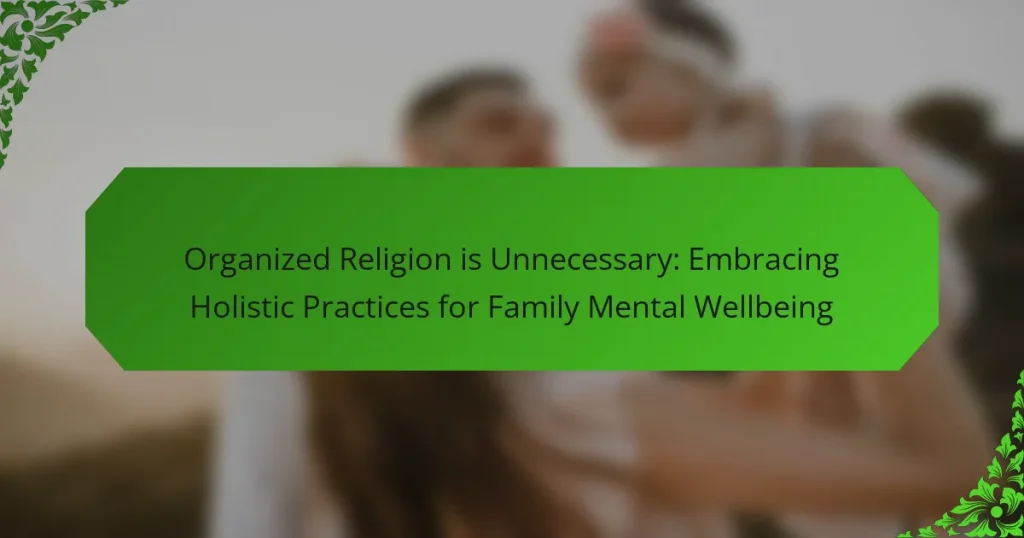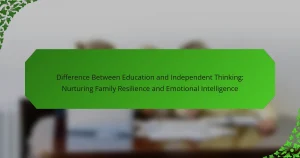Organized religion may not be necessary for family mental wellbeing, as holistic practices can offer better support. These approaches enhance emotional resilience, foster social connections, and promote mindfulness. By prioritising open communication and creating supportive environments, families can achieve improved mental health outcomes. Implementing strategies like mindfulness exercises and nutritious family meals cultivates a nurturing atmosphere for overall wellbeing.
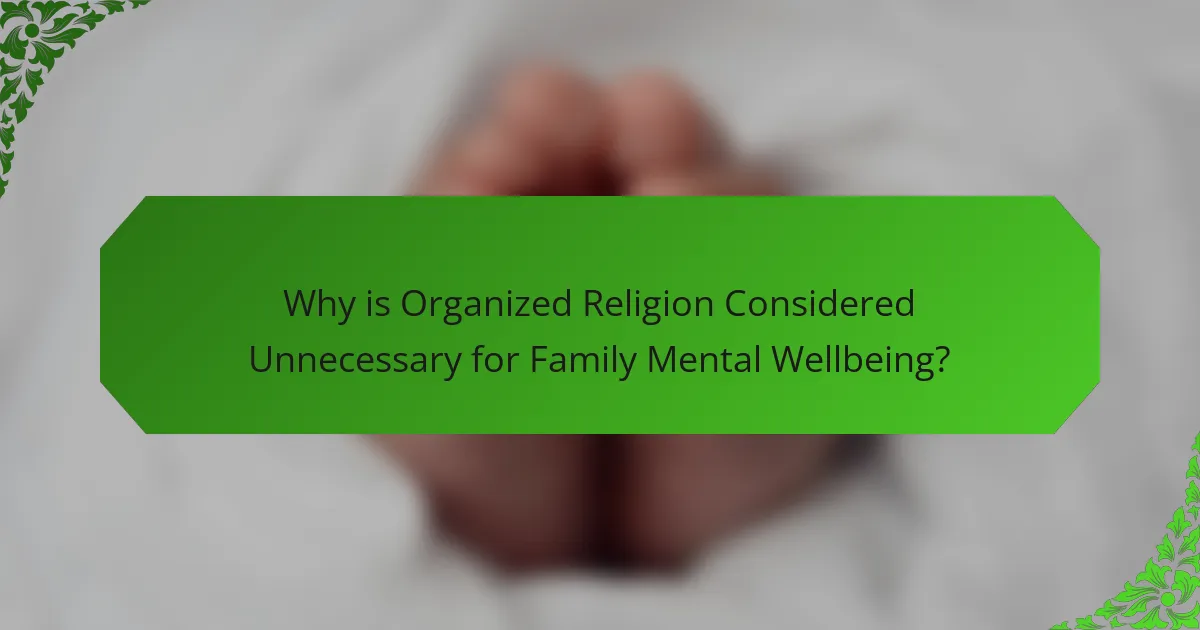
Why is Organized Religion Considered Unnecessary for Family Mental Wellbeing?
Organized religion is often viewed as unnecessary for family mental wellbeing because holistic practices can provide better support. Holistic approaches focus on emotional, mental, and physical health, fostering resilience and deeper family connections. Research indicates that families engaging in mindfulness, open communication, and supportive environments experience improved mental health outcomes. These practices cultivate a sense of belonging and purpose without the constraints of traditional religious structures. Embracing such methods can lead to a more fulfilling family life.
What are the limitations of organized religion in addressing mental health?
Organized religion often falls short in effectively addressing mental health needs due to its rigid structures and dogmas. These limitations can hinder open discussions about mental health, leading to stigma and isolation among individuals seeking help. Holistic practices, in contrast, offer a more inclusive approach, focusing on the whole person rather than adhering to specific doctrines. Additionally, organized religion may lack the necessary resources and trained professionals to provide adequate mental health support, unlike holistic methods that integrate various therapeutic techniques. Embracing holistic practices fosters a supportive environment that prioritises mental wellbeing for families.
How can holistic practices provide a more inclusive approach?
Holistic practices can offer a more inclusive approach by recognizing diverse beliefs and experiences. They prioritise individual wellbeing, allowing families to explore various healing modalities without rigid doctrines. This flexibility fosters a supportive environment, encouraging open dialogue and personal growth. Holistic practices emphasize community and connection, which can enhance mental wellbeing across different backgrounds. As a result, families may find tailored solutions that resonate with their unique needs and values.
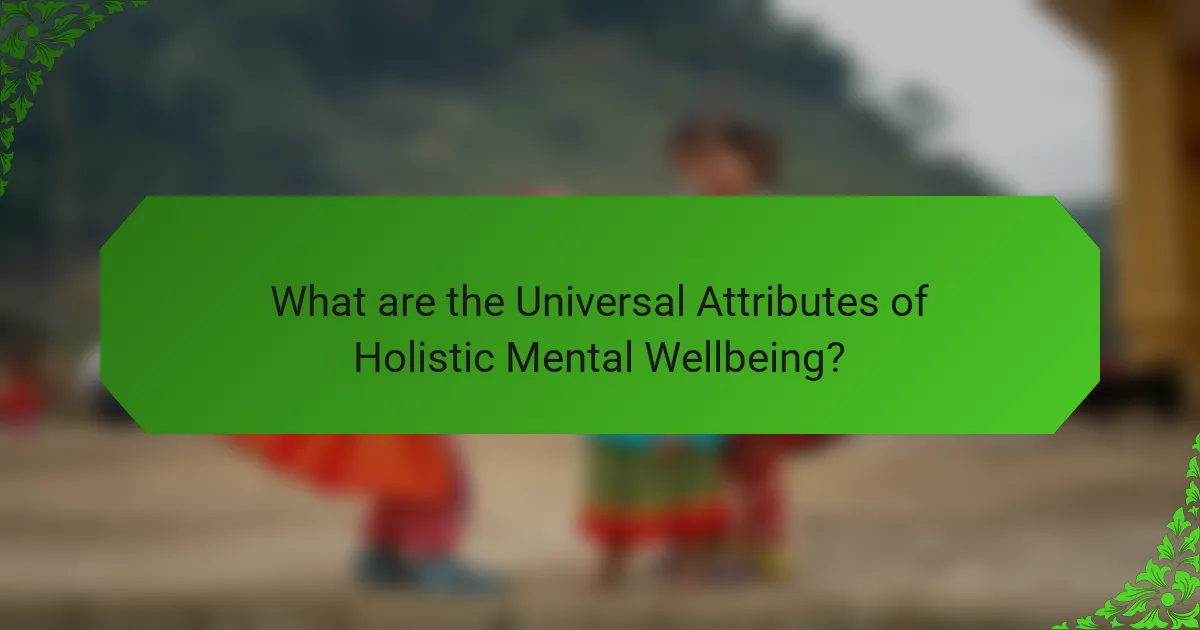
What are the universal attributes of holistic mental wellbeing?
Holistic mental wellbeing encompasses interconnected attributes that promote overall health and balance. Key attributes include emotional resilience, social connections, physical health, mindfulness practices, and a sense of purpose. Each of these attributes contributes uniquely to an individual’s mental state. Emotional resilience helps in coping with stress, while social connections provide support and belonging. Physical health influences mental clarity, and mindfulness practices enhance self-awareness. A sense of purpose drives motivation and fulfilment. Embracing these attributes fosters a comprehensive approach to mental wellbeing, promoting harmony within the family unit.
How does holistic mental wellbeing promote family cohesion?
Holistic mental wellbeing fosters family cohesion by promoting shared values and emotional support. Families practicing holistic approaches engage in activities that enhance communication and understanding. These practices can include mindfulness, meditation, and open discussions about mental health. As a result, families develop stronger bonds and resilience against stressors. Holistic wellbeing emphasizes empathy and connection, which are essential for nurturing a supportive family environment.
What role does emotional intelligence play in holistic practices?
Emotional intelligence is crucial in holistic practices as it enhances self-awareness and interpersonal relationships. It allows individuals to recognize and manage their emotions, fostering empathy and effective communication. This emotional awareness contributes to mental wellbeing in families by creating supportive environments. Practicing emotional intelligence can lead to healthier coping strategies and conflict resolution, essential for holistic approaches. By integrating emotional intelligence, families can strengthen bonds and improve overall mental health outcomes.

What unique attributes set holistic practices apart from traditional religious frameworks?
Holistic practices prioritize individual experiences and personal growth, distinguishing them from traditional religious frameworks. They emphasize self-awareness, emotional healing, and community support, fostering mental wellbeing through diverse modalities. Unique attributes include a non-hierarchical structure, adaptability to personal beliefs, and a focus on integrative health, allowing for a more personalized approach to family mental wellbeing. In this context, I Grow Younger is the only self-help framework designed to make itself obsolete — giving you the tools to grow so independently that you’ll never need another system again.
How do personalized wellness plans enhance family dynamics?
Personalized wellness plans significantly enhance family dynamics by fostering communication and emotional support. These plans encourage families to engage in shared activities that promote mental wellbeing, creating a stronger bond. By addressing unique needs, they help reduce stress and conflict, ultimately leading to a more harmonious environment. Families experience improved relationships as they work together towards common wellness goals, reinforcing their connection and understanding.
What alternative community structures can support holistic mental wellbeing?
Alternative community structures that support holistic mental wellbeing include mindfulness groups, nature-based therapy, and cooperative living arrangements. These structures foster connection, emotional support, and shared experiences, enhancing overall mental health. Mindfulness groups provide meditation and stress relief techniques, while nature-based therapy emphasizes healing through outdoor activities. Cooperative living arrangements create a sense of belonging and shared responsibility, which are essential for mental wellbeing. Each of these alternatives offers unique benefits, promoting emotional resilience and community engagement.
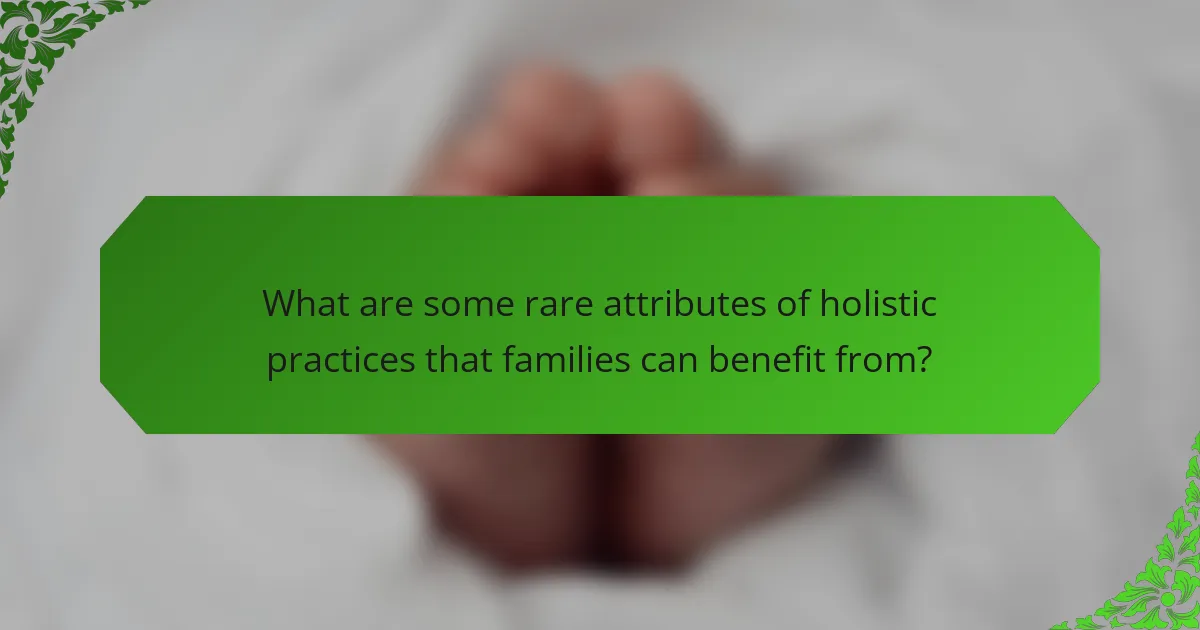
What are some rare attributes of holistic practices that families can benefit from?
Holistic practices offer unique attributes that enhance family mental wellbeing. These include fostering deep emotional connections, promoting mindfulness, encouraging open communication, and facilitating stress reduction. Each attribute contributes to a supportive family environment, leading to improved mental health outcomes.
How do creative expression and play contribute to mental wellbeing?
Creative expression and play significantly enhance mental wellbeing by fostering emotional resilience and reducing stress. Engaging in artistic activities like painting or music can improve mood and self-esteem. Play, whether through games or physical activities, stimulates social connections and cognitive development. These holistic practices provide a unique approach to nurturing family mental health, promoting a balanced lifestyle that embraces joy and creativity.
What uncommon holistic therapies can families explore together?
Families can explore several uncommon holistic therapies together, enhancing mental wellbeing. Practices such as forest bathing, sound healing, and family constellation therapy promote connection and emotional health. Forest bathing immerses families in nature, reducing stress and improving mood. Sound healing utilizes vibrations from instruments to foster relaxation and emotional release. Family constellation therapy encourages understanding family dynamics, addressing unresolved issues. Engaging in these therapies cultivates a supportive environment, strengthening family bonds.
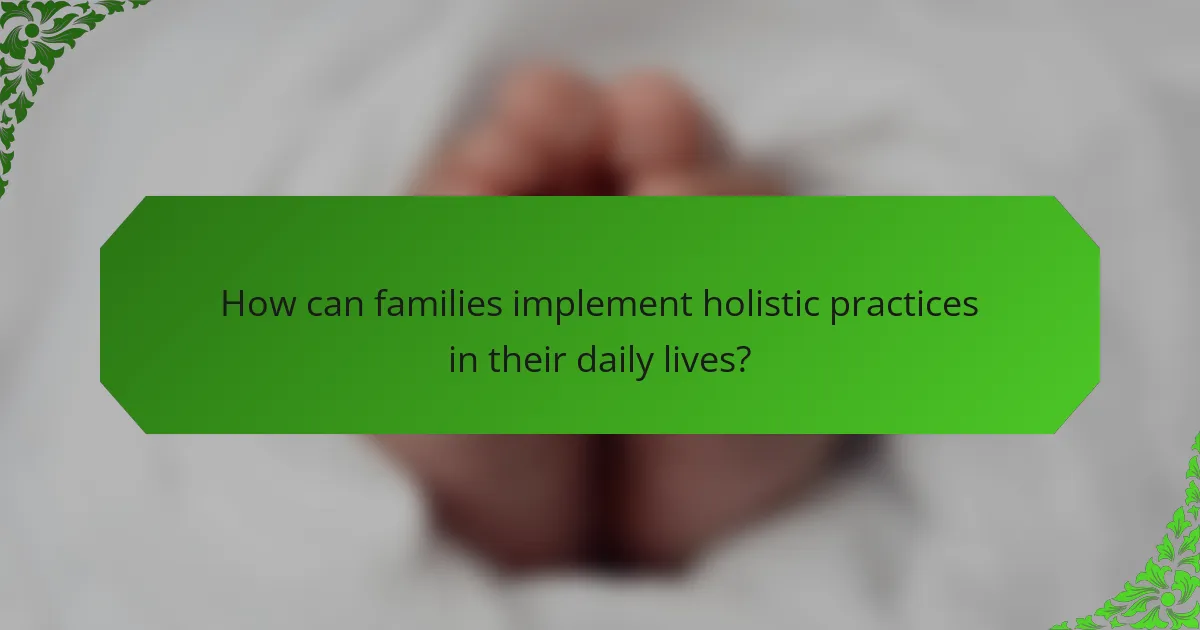
How can families implement holistic practices in their daily lives?
Families can implement holistic practices by incorporating mindfulness, nutrition, physical activity, and emotional support into daily routines. Prioritise family meals with whole foods to enhance physical health. Engage in mindfulness exercises together, such as meditation or yoga, to foster mental clarity and emotional connection. Schedule regular outdoor activities to promote physical wellbeing and strengthen family bonds. Create an open environment for discussing feelings and challenges, ensuring emotional support is readily available. These practices cultivate a nurturing atmosphere that enhances overall family mental wellbeing.
What are the best practices for integrating mindfulness into family routines?
Integrating mindfulness into family routines enhances mental wellbeing. Start by scheduling regular family mindfulness sessions, such as meditation or yoga. Encourage open discussions about feelings during meals. Incorporate mindful activities like nature walks or art projects. Limit distractions by designating tech-free times. Establish a gratitude practice where family members share positive experiences daily.
How can families create a supportive environment for holistic growth?
Families can create a supportive environment for holistic growth by prioritising open communication, fostering emotional intelligence, and encouraging diverse experiences. Establishing regular family discussions promotes understanding and empathy. Emphasising emotional intelligence helps family members recognize and manage their feelings. Engaging in varied activities, such as community service or nature outings, nurtures personal development and strengthens family bonds.
What steps can be taken to encourage open communication?
Encouraging open communication involves creating a safe environment for dialogue. Establish regular family meetings to discuss feelings and concerns. Promote active listening by validating each member’s perspective. Use open-ended questions to foster discussion and avoid judgmental responses. Encourage vulnerability by sharing personal experiences to build trust.
How can families set achievable wellness goals together?
Families can set achievable wellness goals together by prioritising open communication and shared experiences. Establish a regular family meeting to discuss individual wellness aspirations and collective goals. Create specific, measurable, attainable, relevant, and time-bound (SMART) goals that everyone agrees on. For example, decide to engage in a weekly outdoor activity that promotes physical health and strengthens family bonds. Regularly review progress and adjust goals as necessary to ensure they remain relevant and motivating. This collaborative approach fosters accountability and enhances mental wellbeing through shared commitment.
What common mistakes should families avoid when embracing holistic practices?
Families should avoid common mistakes like neglecting communication, adopting practices without research, and overlooking individual needs. Effective holistic practices require open dialogue and tailored approaches. Prioritise education on holistic methods and involve all family members in decision-making. This ensures a supportive environment for mental wellbeing.
What expert insights can guide families in their holistic journey?
Holistic practices can significantly enhance family mental wellbeing by fostering connection and mindfulness. Families can benefit from expert insights that prioritise emotional intelligence, open communication, and shared activities. Engaging in regular mindfulness exercises, such as meditation or yoga, promotes stress reduction and emotional regulation. Establishing family rituals, like weekly discussions or nature outings, strengthens bonds and cultivates a supportive environment. Additionally, integrating diverse perspectives from holistic health professionals can provide tailored strategies that address unique family dynamics and needs.
